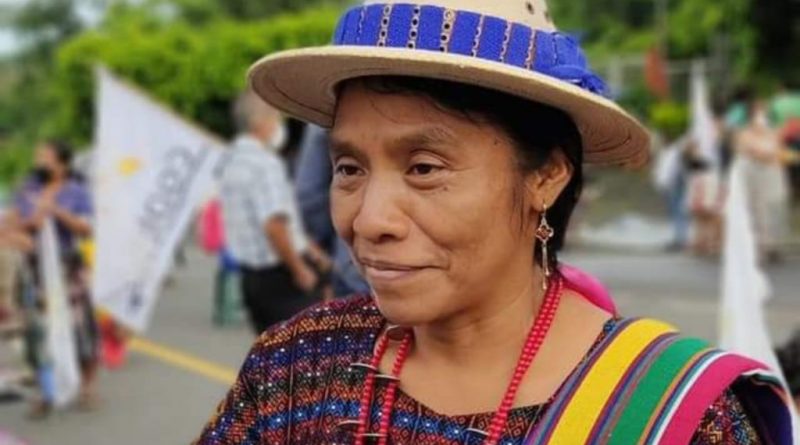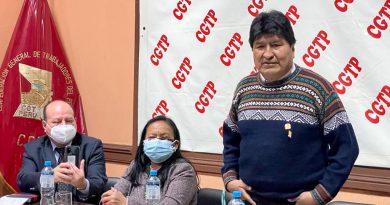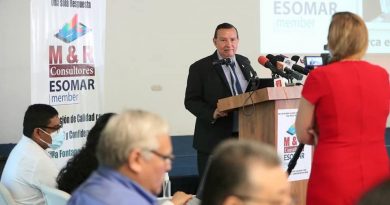Mayan leader Thelma Cabrera runs for Guatemala’s presidency
The following is an exclusive interview for Kawsachun News carried out by Cindy Forster, professor at Scripps College
“I consider myself a defender of Mother Earth,” explains Thelma Cabrera, a Maya-Mam peasant leader whose bid for president –at the head of the Movement for the Liberation of the Peoples (MLP)– was blocked again on March 25th when the campaign season was officially launched. She still hopes to prevail. “The Movement for the Liberation of the Peoples,” Cabrera says, “was formed by the Campesino Development Committee (CODECA) as a political instrument, to fight for a Plurinational State. We are seeking a life of dignity –el buen vivir– through the process of a Constituent Assembly. The new Constitution will be organized by the people. Our proposals and the nineteen points of our platform arose from a discussion in the communities, then the regions, and finally at our national assembly. We voted on each proposal. Through that same process, we choose our candidates.”
Cabrera is jockeying for second or third place after front-runner Zury Ríos, the child of dictator Efraín Ríos Montt, who should be constitutionally barred from running due to her father’s coup d’etat. He died of old age while his conviction for the assassination of 1,771 Indigenous peasants was under appeal. Zury Ríos has always insisted that “There was no genocide,” and she has the blessing of one of Latin America’s most dangerous oligarchies. Guatemala is a narco-state that has driven into exile, jailed or killed its honorable journalists, judges and lawyers. “We know the right has all the systems of government under its control,” says Thelma Cabrera, “to the point of even controlling the defense of human rights.”
The MLP’s call for a Constituent Assembly and Plurinational State takes its inspiration from Bolivia. It would represent some twenty-two Mayan peoples, the Xinka Indigenous nation, and African peoples including the Afro-Indigenous Garífuna. The Indigenous make up the majority of those who suffer stark poverty. Guatemala is home to the largest Indigenous population in the hemisphere, according to the United Nations. Cabrera says the MLP may have won the last presidential elections in 2019 in which they fell a few percentage points behind the neoliberal victor in the first round. “There was fraud.” Cabrera’s campaign suffered systematic censorship. Ballot tampering included “premarked voting materials. There were power outages during the vote count.”
The oligarchy routinely threatens to kill its middle-class critics, and the MLP’s vice presidential candidate and former human rights ombudsman, Jordán Rodas, is among them. The MLP was removed from the presidential race on the basis of legalistic charges against Rodas, that he insists are fabricated.
When CODECA prepared a report several years ago that demonstrated conditions of near-slavery for tens of thousands of campesinos working on Guatemala’s plantations, all of the one hundred and seventeen investigators received death threats. Two were killed. Other leftist parties have taken care to move with caution –sometimes working with US embassy-backed initiatives to root out corruption– but the MLP insists on sovereignty from the right and from the United States. Amilcar Pop, an Indigenous presidential candidate who is a lawyer, is still in the running.
“We are agreed’” says Cabrera, “that we cannot beg favors from the bosses who run the economy and hold the state. In the plantation belt the situation is very cruel. The field supervisors, the plantation administrators and their assistants, not to mention the owners, all exercise grave labor exploitation against farmworkers – in the coffee groves where I grew up and also on the sugar and palm oil plantations, in the banana groves, and on the cattle plantations.”
“This cruelty, this marginalization of the workers, means that in place of raising wages, they increase the harshness of the daily tasks. If you want to work, you have to submit to their conditions. If you don’t, there are many standing in line, desperate to work. If you can take the abuse, they accept you, and if not, there is never a lack of workers willing to take your place. That’s what it’s like on the plantations.”
All this is held in place by corruption. “At its root, corruption is a structural problem like a cyst incrusted in the presidency, within congress, and in the judicial sector as well because corruption has taken over everything that could be called justice. The public prosecutors at the local level in the towns are so corrupt they refuse to accept criminal cases. When people are assassinated, when the impoverished peoples face sabotage of their organizing, when we exercise our right to resist, we are pursued, criminalized and murdered.”
Savage capitalism
“Before, there were small plots of land to rent in the plantation zone, but not now. Sugar cane and palm oil have taken over everything. Transnational companies have brought us only death and violence. Where I live they’ve brought us malnutrition and sickness, and that’s true at the national level as well. From our experience on the South Coast, I can tell you of the expansion of the plantations across fertile soils. Lands we used to farm are no longer in the hands of campesinos. They are in the hands of the big planters who take advantage of their power to kidnap Mother Earth, to sicken her and to sicken us, the impoverished peoples who have always lived here. Our health is badly contaminated. The rivers and soils are being ruined by aerial fumigation. Campesinos no longer have fruit to eat. In the irrigation channels, polluted waters have caused the fruit of the trees to ripen full of worms. Our territory is so poisoned by their chemicals, that even the fruit trees can no longer produce.”
“So they’ve looted [saqueado] everything and on top of that, there’s the theft of privatization, the high cost of electricity, and the pillage of our gold and silver. The rich pay no taxes. They force us into a system of taxation based on our purchases where a receipt is issued for everything, while they go about laundering their drug money and avoiding taxes. The people forced into poverty are the ones who pay taxes and for that we receive nothing in the way of social programs. The hospitals are in unbelievably bad condition.”
CODECA’s approach to ending capitalism and imperialism is matter-of-fact and immediate. Most of its members are Indigenous, so ending racism is central to their anti-capitalism. They have refused to pay exorbitant electricity bills where one weak lightbulb illuminates an entire home, and on this issue, CODECA has organized marches made up of tens of thousands of peasants. Its target, the energy company Energuate, is majority British-owned by Actis Capital. CODECA’s road blockades have challenged rampant privatization, transnational strip-mining, and corporate theft of water. Many agro-export zones, including Cabrera’s home region, are suffering serious water shortages for the first time ever, due to the plantation owners’ rerouting and monopolization of rivers and springs.
The township where Cabrera lives, El Asintal, lies in the center of what used to be a verdant subtropical belt with countless bird species that runs below the volcanoes, from Mexico to El Salvador, but today its rivers are running dry. Cabrera’s native language, Maya-Mam, is thought to have been spoken by the ancient peoples whose ruins are located in Asintal, which is the southernmost site of one of the massive carved stone heads of the Olmecs – described as the mother culture of ancient Mexico. The Maya ruled a thriving city-state there from one millennium before the common era to one millennium afterwards, in communication with Central Mexico. Campesinos are intensely proud of the Mayan inheritance that guides their political work and defines their respect for the earth and its waters.
Thelma Cabrera credits her mother –who never went to school– as the source of her consciousness. Indigenous values of collectivity lie at the heart of the threat to savage capitalism. “Our sons and daughters are not guaranteed any schooling at all. When there is a school, they force our daughters to use official uniforms even though we have our own cultures and our own ways of dressing” – that are supposedly protected by the Constitution. In some classrooms in Guatemala’s capital, mestizo teachers are known to inform their pupils that the Maya are monkeys, or perhaps creatures from outer space. “The educational system is designed so that our brothers and sisters in the teaching profession implement a project that molds the brains of our sons and our daughters to their way of thinking.”
Structural injustice
“Our project includes migrants,” Cabrera says. Four million Guatemalan citizens live in the United States –including one of Thelma Cabrera’s 4 children– and most do not vote. The MLP has designed a plan to engage the campesinos and workers who have been forced by neoliberalism to migrate. In a population of over seventeen million, some 9 million Guatemalans are eligible to vote but that figure excludes most of the people whose remittances bring in one-fifth of Guatemala’s GDP, an amount which outpaces exports. Elites in the United States as well as Guatemala extract fortunes from the precarity of Guatemalan migrant labor in the United States.
“I have to work to survive and my work is with CODECA,” explains Cabrera. Because her job entails organizing campesinos, twice the electoral authorities have “accused me of starting my campaign before the legal launch of the election season.”
The MLP was registered as a political party in 2016 by CODECA, the Committee for Campesino Development. CODECA formed in 1992 –during the war– to fight for land and Indigenous rights. Its campesino membership was 90% landless when Cabrera and her husband joined in the 1990s.
Campesino organizers in Guatemala suffer one of the highest assassination rates per capita in the world. Elites continue the counter-revolutionary practices of a war that lasted three decades and ended in 1996, during which 200,000 civilians were killed by the state; 45,000 more were disappeared. Campesinos over thirty years old emerged from that terror. In recent years, CODECA members have numbered disproportionately among the victims of political murder.
Thelma Cabrera focuses on the long haul in the struggle to end structural injustice. June 25 elections are a mere three months away. Officially that date is celebrated as teachers’ day, and commemorates the martyred teacher María Chinchilla who was killed in a demonstration against the notorious dictator General Jorge Ubico. Those demonstrations helped give birth to ten years of social democracy from 1944 to 1954, and a vast agrarian reform won through campesino organizing. Proportionate to the population, it was one of the largest eras of land redistribution in twentieth century Latin America and the Caribbean. Many peasants who are crushed by the agro-export economy today remember that their grandparents fought for and got land, labor rights and unions on the plantations, clinics, schools, and political parties run through collective assemblies of the Indigenous and campesinos.
That was the only era of democracy the majorities have known since Guatemala became a country. It is more well-known outside Guatemala for its violent end –a coup d’etat– than its massive campesino mobilization from the start to the end of the decade. In 1954, a CIA-trained army entered from Honduras. On the same South Coast where CODECA challenges the plantations that commit atrocities daily, the CIA-backed coup killed about one thousand campesinos, bringing them to a United Fruit Company plantation, called Finca Jocotán, where they were shot into open trenches.
“At least 26 assassinations of CODECA leaders have taken place in the last four years,” Cabrera said, her gaze averted to hide the pain. “No one has been arrested or investigated.”
“This is what happens to us in Guatemala. This is the news I can give you to take to the international level. What is happening in this country? When we organize, they assassinate us. Proof of this, they came to murder Dominga Ramos in her own home, because she defended the land. She defended the territories of the Indigenous. For defending nationalization of common goods and services that have been privatized in Guatemala, Dominga Ramos, like many women, gave her life to defend our rights. There have been men like Luis Arturo Marroquín,” the Xinca leader who was the regional coordinator of CODECA for the department of Jalapa. “He defended Mother Earth and all the basic services people need, that must not be privatized. His death has remained in impunity. This is why we are in struggle.”
“We will fight for a Plurinational State through the process of a people’s Constituent Assembly, to achieve el buen vivir or a way of living where all the peoples participate in the decisions. Where participatory and community-based democracy is governed by the Indigenous peoples, and the peoples create the initiatives for laws that serve them, that is, from the collective sense of all the nations that make up Guatemala. The crises we are living through are the result of structural problems. This is a project of the exploited peoples of Guatemala. It will continue.”
For more news and analysis, become a subscriber and access our podcast Latin America Review: https://www.patreon.com/KawsachunNews



